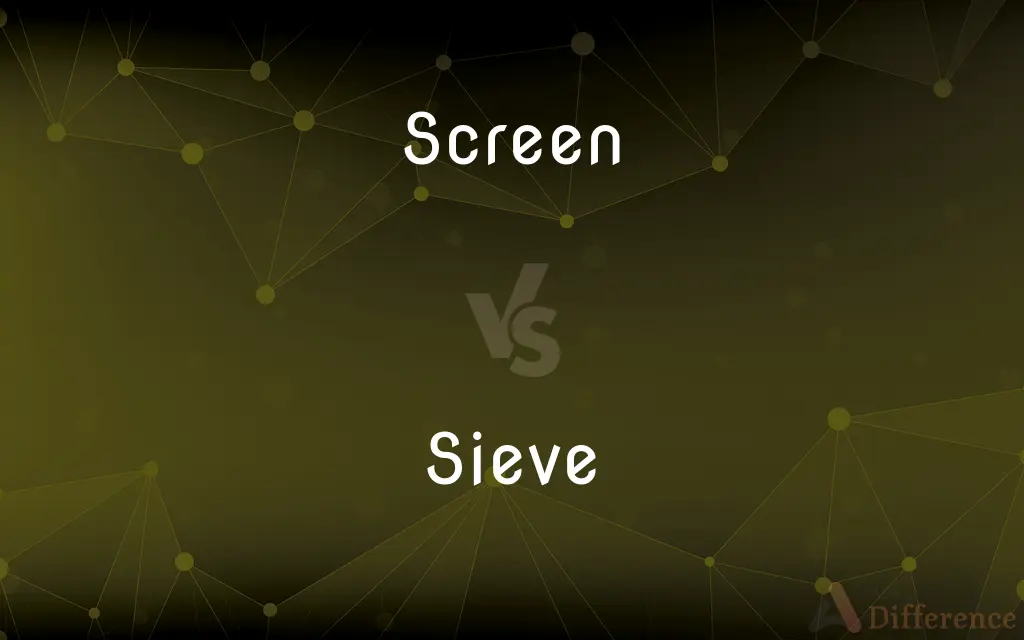Screen vs. Sieve — What's the Difference?
By Fiza Rafique & Urooj Arif — Updated on April 19, 2024
Screen is primarily used to block, filter, or separate materials visually or physically, while a sieve is specifically designed to separate particles by size through a mesh.

Difference Between Screen and Sieve
Table of Contents
ADVERTISEMENT
Key Differences
A screen can be made of various materials such as metal, plastic, or fabric and is used in many applications including doors, windows, and electronic devices to block unwanted elements. In contrast, a sieve typically features a mesh made from metal or plastic and is used to separate finer particles from coarser ones, especially in cooking and industrial processes.
Screens serve a wide range of purposes; they can provide privacy, reduce sunlight, or protect against insects when used in windows and doors. Sieves, however, are mainly utilized for separating and grading different sizes of materials in both kitchen and industrial contexts.
In technology, screens are crucial components of devices such as televisions, smartphones, and computers, where they display visual information. Sieves do not find application in technology but are indispensable in food preparation and scientific research where precise particle separation is necessary.
The design of a screen can vary significantly, ranging from tightly woven fabric in window screens to the complex, high-resolution displays of electronic devices. Conversely, sieves have a more uniform design, characterized by a frame that holds a mesh of specific size openings to filter substances.
Screens also play an important role in safety and security systems, acting as barriers that prevent access or protect against larger debris. Sieves do not provide physical security or protection but are crucial for quality control by ensuring materials meet required textural specifications.
ADVERTISEMENT
Comparison Chart
Material
Metal, plastic, fabric
Usually metal or plastic mesh
Purpose
Block, protect, filter, display information
Separate particles by size
Applications
Doors, windows, electronics
Cooking, industrial processing
Design Variety
Wide range from simple to complex
Generally uniform with varying mesh sizes
Role in Safety
Physical barrier, protection
Quality control in material processing
Compare with Definitions
Screen
A fine mesh used to keep insects out of a building.
We installed a screen on our windows to keep the mosquitoes out.
Sieve
An implement used in gardening to sift soil.
He sifted the compost through a sieve to remove any large clumps.
Screen
A device for showing visual output on electronics.
The latest phones feature an OLED screen for sharper images.
Sieve
A tool with a mesh to separate finer particles from coarser ones.
She used a sieve to dust flour on her cake.
Screen
A process to evaluate or check qualifications.
Applicants must be screened through a background check.
Sieve
A device in science labs for particle size analysis.
The sand samples were sorted using a sieve with different mesh sizes.
Screen
A barrier used to conceal or protect areas.
The construction site was hidden behind a green screen.
Sieve
A metaphor for something that does not hold all contents.
His memory is like a sieve, forgetting details quickly.
Screen
A medium for projecting films or images.
The movie was displayed on a large screen at the park.
Sieve
A utensil used in kitchens to strain liquids from solids.
After boiling, pour the pasta into a sieve to drain the water.
Screen
A movable device, especially a framed construction such as a room divider or a decorative panel, designed to divide, conceal, or protect.
Sieve
A sieve, fine mesh strainer, or sift, is a device for separating wanted elements from unwanted material or for characterizing the particle size distribution of a sample, using a screen such as a woven mesh or net or perforated sheet material. The word "sift" derives from "sieve".
Screen
One that serves to protect, conceal, or divide
Security guards formed a screen around the president. A screen of evergreens afforded privacy from our neighbors.
Sieve
A utensil of wire mesh or closely perforated metal or plastic, used for straining, sifting, ricing, or puréeing.
Screen
A surface, as on a smartphone, television, or computer monitor, on which one can read and view electronically displayed information and images.
Sieve
To pass through a sieve.
Screen
A surface on which text and images are projected for display.
Sieve
To use a sieve; sift.
Screen
The medium in which movies are shown
A star of stage and screen.
Sieve
A device with a mesh bottom to separate, in a granular material, larger particles from smaller ones, or to separate solid objects from a liquid.
Use the sieve to get the pasta from the water.
Screen
A coarse sieve used for sifting out fine particles, as of sand, gravel, or coal.
Sieve
A process, physical or abstract, that arrives at a final result by filtering out unwanted pieces of input from a larger starting set of input.
Given a list of consecutive numbers starting at 1, the Sieve of Eratosthenes algorithm will find all of the prime numbers.
Screen
A system for preliminary appraisal and selection of personnel as to their suitability for particular jobs.
Sieve
(obsolete) A kind of coarse basket.
Screen
A window or door insertion of framed wire or plastic mesh used to keep out insects and permit air flow.
Sieve
(colloquial) A person, or their mind, that cannot remember things or is unable to keep secrets.
Screen
A body of troops or ships sent in advance of or surrounding a larger body to protect or warn of attack.
Sieve
An intern who lets too many non-serious cases into the emergency room.
Screen
(Sports) A block, set with the body, that impedes the vision or movement of an opponent.
Sieve
(category theory) A collection of morphisms in a category whose codomain is a certain fixed object of that category, which collection is closed under precomposition by any morphism in the category.
Screen
(Football) A screen pass.
Sieve
To strain, sift or sort using a sieve.
Screen
To show or project (a movie, for example) on a screen.
Sieve
(sports) To concede; let in
Screen
To conceal from view with a screen or something that acts like a screen
"Only a narrow line of brush and saplings screened the broad vista of the marsh" (David M. Carroll).
Sieve
A utensil for separating the finer and coarser parts of a pulverized or granulated substance from each other. It consist of a vessel, usually shallow, with the bottom perforated, or made of hair, wire, or the like, woven in meshes.
Screen
To protect, guard, or shield
"This rose is screened from the wind with burlap" (Anne Raver).
Sieve
A kind of coarse basket.
Screen
To provide with a screen or screens
Screen a porch.
Sieve
A strainer for separating lumps from powdered material or grading particles
Screen
To separate or sift out (fine particles of sand, for example) by means of a sieve or screen.
Sieve
Examine in order to test suitability;
Screen these samples
Screen the job applicants
Screen
To sort through and eliminate unwanted examples of (something)
A filter that screens email, preventing spam from reaching the inbox.
Sieve
Check and sort carefully;
Sift the information
Screen
To examine (a job applicant, for example) systematically in order to determine suitability.
Sieve
Separate by passing through a sieve or other straining device to separate out coarser elements;
Sift the flour
Screen
To test or evaluate (a student) to determine placement in an educational system or to identify specific learning needs.
Sieve
Distinguish and separate out;
Sift through the job candidates
Screen
To subject to genetic screening.
Screen
To block the vision or movement of (an opponent) with the body.
Screen
To obscure an opponent's view of (a shot) by positioning oneself between the opponent and the shooter.
Screen
A physical divider intended to block an area from view, or provide shelter from something dangerous.
A fire screen
Screen
A material woven from fine wires intended to block animals or large particles from passing while allowing gasses, liquids and finer particles to pass.
Screen
A frame supporting a mesh of bars or wires used to classify fragments of stone by size, allowing the passage of fragments whose a diameter is smaller than the distance between the bars or wires.
Screen
(baseball) The protective netting which protects the audience from flying objects
Jones caught the foul up against the screen.
Screen
(printing) A stencil upon a framed mesh through which paint is forced onto printed-on material; the frame with the mesh itself.
Screen
(by analogy) Searching through a sample for a target; an act of screening
A drug screen, a genetic screen
Screen
(genetics) A technique used to identify genes so as to study gene functions.
Screen
Various forms or formats of information display
Screen
The viewing surface or area of a movie, or moving picture or slide presentation.
Screen
The informational viewing area of electronic devices, where output is displayed.
Screen
One of the individual regions of a video game, etc. divided into separate screens.
Screen
(computer) The visualised data or imagery displayed on a computer screen.
After you turn on the computer, the login screen appears.
Screen
(figurative) A disguise; concealment.
Screen
Definitions related to standing in the path of an opposing player
Screen
(American football) screen pass
Screen
(basketball) An offensive tactic in which a player stands so as to block a defender from reaching a teammate.
Screen
(cricket) An erection of white canvas or wood placed on the boundary opposite a batsman to make the ball more easily visible.
Screen
(nautical) A collection of less-valuable vessels that travel with a more valuable one for the latter's protection.
Screen
(architecture) A dwarf wall or partition carried up to a certain height for separation and protection, as in a church, to separate the aisle from the choir, etc.
Screen
A large scarf.
Screen
To filter by passing through a screen.
Mary screened the beans to remove the clumps of gravel.
Screen
To shelter or conceal.
Screen
To remove information, or censor intellectual material from viewing. To hide the facts.
The news report was screened because it accused the politician of wrongdoing.
Screen
To present publicly (on the screen).
The news report will be screened at 11:00 tonight.
Screen
To fit with a screen.
We need to screen this porch. These bugs are driving me crazy.
Screen
(medicine) To examine patients or treat a sample in order to detect a chemical or a disease, or to assess susceptibility to a disease.
Screen
(molecular biology) To search chemical libraries by means of a computational technique in order to identify chemical compounds which would potentially bind to a given biological target such as a protein.
Screen
(basketball) To stand so as to block a defender from reaching a teammate.
Screen
To determine the source or subject matter of a call before deciding whether to answer the phone.
Screen
Anything that separates or cuts off inconvenience, injury, or danger; that which shelters or conceals from view; a shield or protection; as, a fire screen.
Your leavy screens throw down.
Some ambitious men seem as screens to princes in matters of danger and envy.
Screen
A dwarf wall or partition carried up to a certain height for separation and protection, as in a church, to separate the aisle from the choir, or the like.
Screen
A surface, as that afforded by a curtain, sheet, wall, etc., upon which an image, as a picture, is thrown by a magic lantern, solar microscope, etc.
Screen
A long, coarse riddle or sieve, sometimes a revolving perforated cylinder, used to separate the coarser from the finer parts, as of coal, sand, gravel, and the like.
Screen
An erection of white canvas or wood placed on the boundary opposite a batsman to enable him to see ball better.
Screen
A netting, usu. of metal, contained in a frame, used mostly in windows or doors to allow in fresh air while excluding insects.
Screen
The surface of an electronic device, as a television set or computer monitor, on which a visible image is formed. The screen is frequently the surface of a cathode-ray tube containing phosphors excited by the electron beam, but other methods for causing an image to appear on the screen are also used, as in flat-panel displays.
Screen
The motion-picture industry; motion pictures.
Screen
To provide with a shelter or means of concealment; to separate or cut off from inconvenience, injury, or danger; to shelter; to protect; to protect by hiding; to conceal; as, fruits screened from cold winds by a forest or hill.
They were encouraged and screened by some who were in high commands.
Screen
To pass, as coal, gravel, ashes, etc., through a screen in order to separate the coarse from the fine, or the worthless from the valuable; to sift.
Screen
To examine a group of objects methodically, to separate them into groups or to select one or more for some purpose.
Screen
A white or silvered surface where pictures can be projected for viewing
Screen
Something that keeps things out or hinders sight;
They had just moved in and had not put up blinds yet
Screen
Display on the surface of the large end of a cathode-ray tube on which is electronically created
Screen
A covering that serves to conceal or shelter something;
They crouched behind the screen
Under cover of darkness
Screen
Protective covering consisting of a metallic netting mounted in a frame and covering windows or doors (especially for protection against insects)
Screen
A strainer for separating lumps from powdered material or grading particles
Screen
A door that is a screen to keep insects from entering a building through the open door;
He heard the screen slam as she left
Screen
Partition consisting of a decorative frame or panel that serves to divide a space
Screen
Examine methodically;
Screen the suitcases
Screen
Examine in order to test suitability;
Screen these samples
Screen the job applicants
Screen
Project onto a screen for viewing;
Screen a film
Screen
Prevent from entering;
Block out the strong sunlight
Screen
Separate with a riddle, as grain from chaff
Screen
Protect, hide, or conceal from danger or harm
Common Curiosities
Where are screens commonly used?
Screens are used in windows, doors, electronic devices, and cinemas.
Where are sieves commonly used?
Sieves are primarily used in kitchens, laboratories, and industrial processes.
What is a screen?
A screen can refer to a mesh barrier, a digital display, or a surface used for projection.
What are the typical materials for sieves?
Sieves usually consist of metal or plastic meshes.
Are screens or sieves more durable?
Durability depends on material and construction, but generally, screens designed for protection are sturdier.
How do I choose the right screen for a window?
Consider the purpose, such as insect blocking or privacy, and choose material strength accordingly.
What is a sieve?
A sieve is a device with a mesh used for separating fine particles from coarser ones.
What is the difference in mesh size between a screen and a sieve?
Screens can have varied mesh sizes depending on the application, while sieves are specifically sized for filtering particles.
How do screens enhance safety?
Screens can act as barriers to protect against insects, debris, or unauthorized entry.
Can a screen serve the same purpose as a sieve?
While both can filter, a screen is more versatile but generally less precise in particle separation compared to a sieve.
How do sieves improve product quality?
Sieves ensure material consistency and texture in culinary and industrial products.
Are sieves used in electronic devices?
No, sieves are not used in electronic devices but are essential in various physical processing tasks.
How do screen materials vary?
Screen materials can range from fabric and metal to sophisticated electronic panels.
Can screens display information?
Yes, screens in electronic devices are essential for displaying visual information.
How do I clean a sieve?
Cleaning a sieve typically involves washing with soap and water, sometimes using a brush to remove stuck particles.
Share Your Discovery

Previous Comparison
Wit vs. Clever
Next Comparison
Randomize vs. RandomiseAuthor Spotlight
Written by
Fiza RafiqueFiza Rafique is a skilled content writer at AskDifference.com, where she meticulously refines and enhances written pieces. Drawing from her vast editorial expertise, Fiza ensures clarity, accuracy, and precision in every article. Passionate about language, she continually seeks to elevate the quality of content for readers worldwide.
Co-written by
Urooj ArifUrooj is a skilled content writer at Ask Difference, known for her exceptional ability to simplify complex topics into engaging and informative content. With a passion for research and a flair for clear, concise writing, she consistently delivers articles that resonate with our diverse audience.














































